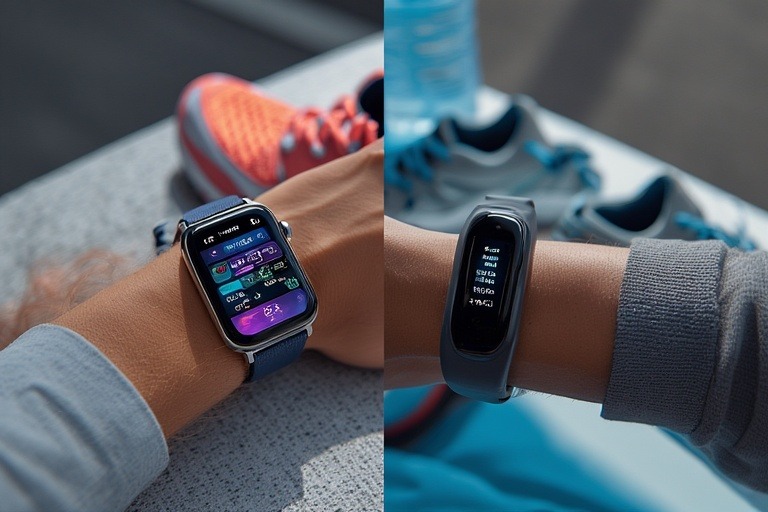In today’s fast-paced lifestyle, staying healthy has become a priority. And thanks to technology, we now have wearable health and fitness trackers—devices that monitor everything from heart rate and sleep patterns to workouts and calories burned. But when it comes to choosing between smartwatches and fitness bands, the decision isn’t always easy.
In this blog, we’ll review both categories, compare their features, highlight their pros and cons, and see what’s trending in 2025.
🏃♂️ Why Wearables Have Become Essential
Gone are the days when wearables were just fancy accessories. Today, they’re personal health companions. People are increasingly turning to smartwatches and fitness bands to:
-
Track daily activity levels.
-
Monitor vital signs (heart rate, SpO2, blood pressure, etc.).
-
Set workout goals and get performance insights.
-
Stay motivated with reminders and progress updates.
With rising awareness about fitness and well-being, wearables are no longer a luxury—they’re becoming a lifestyle necessity.
⌚ Smartwatches – The All-Rounder
Smartwatches have transformed from basic digital watches into mini-smartphones on your wrist. Their greatest strength lies in versatility:
-
Comprehensive Tracking: Steps, heart rate, stress monitoring, ECG, and even sleep stages.
-
Smart Features: Call handling, notifications, GPS navigation, and music control.
-
Fashion & Lifestyle: Premium look, customizable dials, and compatibility with formal or casual wear.
👉 In short, smartwatches are perfect for those who want health + productivity + style in one device.
🎽 Fitness Bands – Simplicity & Focus
Fitness bands, on the other hand, are designed with a sharper focus on health and activity tracking.
-
Lightweight & Comfortable: Ideal for all-day wear and workouts.
-
Budget-Friendly: Much cheaper than premium smartwatches.
-
Focused Tracking: Steps, calories, sleep, heart rate, and workout modes.
Unlike smartwatches, fitness bands don’t try to replace your phone. Instead, they act as a dedicated fitness partner for those who want simple tracking without distractions.
🔎 Smartwatches vs Fitness Bands – A Comparison
When deciding between the two, here’s how they generally stack up:
-
Display & Design: Smartwatches have bigger, stylish screens, while bands are minimal and compact.
-
Battery Life: Fitness bands usually last longer (up to 7–14 days), while smartwatches need charging every 1–3 days.
-
Features: Smartwatches win in versatility; fitness bands win in simplicity.
-
Price Range: Smartwatches are expensive; bands are budget-friendly.
👉 If you’re a tech-savvy professional, go for a smartwatch. If you’re a fitness-first user on a budget, a fitness band is enough.
📈 The 2025 Trends in Wearable Fitness
This year, wearable health tech has reached new heights:
-
AI-Powered Health Insights: Smart algorithms now analyze your body data and suggest workouts, diets, and sleep improvements.
-
Medical-Grade Sensors: Blood oxygen, ECG, and even glucose monitoring features are becoming mainstream.
-
Integration with Apps: Devices sync with fitness apps, diet planners, and even telemedicine platforms.
-
Fashion Meets Fitness: Smartwatches are being designed as luxury accessories, blending tech with style.
Wearables are no longer just trackers—they’re becoming health consultants on your wrist.
❌ Limitations of Wearables
While smartwatches and fitness bands are incredibly useful, they’re not perfect:
-
Accuracy Issues: Readings can sometimes be less accurate than medical devices.
-
Short Lifespan: Tech upgrades every year, making older models outdated quickly.
-
Battery Drain: Smartwatches especially require frequent charging.
-
Over-Reliance: Some users may get too dependent on data rather than listening to their body.
Still, when used wisely, they offer valuable insights to improve health and fitness.
🏆 Final Review – Which One Should You Buy?
Both smartwatches and fitness bands have their unique strengths.
-
Smartwatches: Best for professionals and tech lovers who want fitness + productivity + fashion.
-
Fitness Bands: Perfect for students, budget-conscious users, and those who want a dedicated fitness tracker without extra features.
👉 Verdict: If you want an all-rounder device, invest in a smartwatch. But if your priority is only tracking workouts and health on a budget, a fitness band will serve you well.
✨ Conclusion – The Future of Fitness on Your Wrist
Wearable health and fitness trackers are no longer optional—they’re becoming integral to everyday health management. In 2025, with the rise of AI-powered insights and medical-grade tracking, these devices are stepping closer to being personal health coaches.
Whether you choose a smartwatch or a fitness band, one thing is clear: wearable tech is shaping the future of health and lifestyle. And with more innovations on the horizon, the next generation of wearables might not just track your health—they may help you prevent illnesses before they happen.















